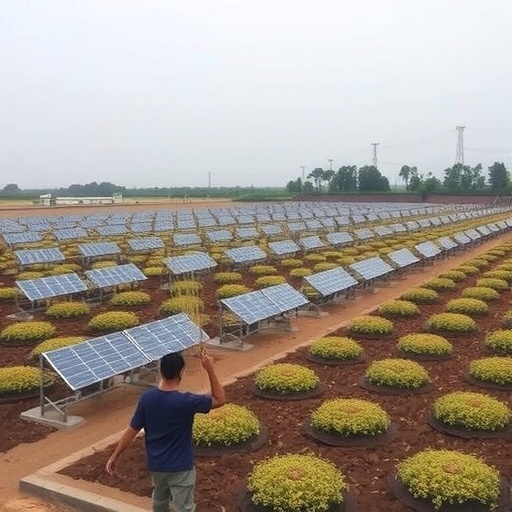Agricultural systems play a critical role in the economy and food security of nations, particularly in low-income food-deficit countries. These systems are increasingly susceptible to a range of vulnerabilities, including climate extremes, geopolitical tensions, and infrastructural constraints. One such nation is the Democratic People’s Republic of Korea (DPRK), which faces significant agricultural challenges compared to its southern counterpart, the Republic of Korea (ROK). Research reveals that the DPRK exhibits a notably lower agricultural drought resistance under similar meteorological drought conditions. This disparity raises pressing questions about the capacity of the DPRK’s agricultural systems to withstand adverse climatic events and sustain food production.
Using a combination of remote sensing technologies and meteorological observations, scientists have meticulously analyzed the agricultural resilience of both Koreas. The findings indicate that the DPRK is more vulnerable to agricultural droughts than the ROK, despite experiencing similar levels of drought severity. The implications of these findings are profound, suggesting that existing agricultural practices in the DPRK are inadequate to cope with the increasing frequency and intensity of drought events triggered by climate change. The consequences extend beyond immediate food production challenges; they ripple throughout the socio-economic fabric of the nation, exacerbating existing humanitarian issues.
One of the primary culprits behind this disparity in drought resilience is the energy shortages that plague the DPRK. These shortages are primarily driven by long-standing trade sanctions that have limited the nation’s ability to secure necessary resources, including fuel for agricultural activities. Irrigation plays a crucial role in mitigating the impacts of drought; however, the DPRK’s limited energy resources significantly constrain its irrigation capacity. Consequently, this limitation leads to decreased crop yields and increased food insecurity, severely impacting the livelihoods of millions.
Moreover, strategic decisions regarding agricultural management in the DPRK are hampered by the lack of modern technology and infrastructure that could bolster drought resistance. Unlike the ROK, which has invested heavily in agricultural research and development, the DPRK’s commitment to advancing its agricultural technologies has waned. While advanced irrigation systems and drought-resistant crops have enabled countries like the ROK to maintain robust agricultural production even during challenging climatic conditions, the DPRK remains reliant on outdated practices that are ill-suited to contemporary challenges.
Furthermore, the socio-political landscape within the DPRK poses additional barriers to effective agricultural adaptation. The centralized control of agricultural resources hampers the ability of local farmers to respond to changing environmental conditions. Without the autonomy to implement adaptive strategies, farmers in the DPRK are left vulnerable to the whims of increasingly unpredictable climate patterns. These systemic issues compound the already precarious food security situation, creating a cycle of vulnerability that is difficult to break.
The ramifications of inadequate drought resistance extend beyond immediate agricultural output; they also affect nutritional status and public health. As food availability decreases, the population’s access to essential nutrients diminishes, leading to a rise in malnutrition rates. Children, pregnant women, and the elderly are particularly susceptible to the adverse health impacts associated with food scarcity. As malnutrition rates climb, the long-term developmental prospects of vulnerable populations are jeopardized, perpetuating a cycle of poverty and deprivation.
Efforts to improve agricultural resilience in the DPRK necessitate urgent attention from both domestic and international stakeholders. Investments in sustainable agricultural practices, coupled with the introduction of modern irrigation technologies, could enhance drought resistance and alleviate food insecurity. Moreover, fostering collaborations with international organizations specializing in agricultural development could provide the DPRK with access to valuable resources, knowledge, and technology that have proven effective in other regions facing similar challenges.
However, geopolitical tensions often stand in the way of meaningful collaboration. The DPRK’s isolationist policies, combined with the restrictions imposed by international sanctions, complicate the development of robust agricultural systems. Establishing trust and facilitating dialogue between the DPRK and external partners are essential steps toward leveraging shared expertise in agricultural adaptation. By working together, nations can develop adaptive strategies that align with the unique cultural and socio-economic contexts of the DPRK.
In conclusion, the findings regarding the agricultural drought resistance of the DPRK present a clarion call for action. As climate change continues to exacerbate extreme weather events, the vulnerabilities of agricultural systems must be addressed with urgency and precision. A holistic approach that encompasses technological innovation, infrastructural investment, and diplomatic engagement is essential to bolster the resilience of the DPRK’s agricultural sector. If left unaddressed, the implications of these vulnerabilities will extend far beyond the agricultural realm, threatening not only national food security but also the stability and well-being of the entire population.
The ongoing research into the agronomic challenges faced by the DPRK is a testament to the necessity for critical evaluation of agricultural practices in the face of changing climatic conditions. By understanding these dynamics, stakeholders can forge a path toward a more resilient agricultural future. The time for action is now; the stakes have never been higher, and the international community must mobilize to assist nations like the DPRK in overcoming the multifaceted challenges they face.
As we continue to monitor and analyze the developments in agricultural resilience amid climate and resource constraints, the insights gained could guide other nations experiencing similar challenges. The key takeaway remains clear: robust agricultural systems are foundational to food security, human health, and social stability. Investing in their resilience is not just an option but a necessity for the future of global food systems.
Subject of Research: Agricultural drought resistance in the Democratic People’s Republic of Korea versus the Republic of Korea
Article Title: Energy shortages undermine agricultural drought resistance in the Democratic People’s Republic of Korea
Article References:
Zhang, Q., Dong, J., Xu, Z. et al. Energy shortages undermine agricultural drought resistance in the Democratic People’s Republic of Korea.
Nat Food (2025). https://doi.org/10.1038/s43016-025-01226-8
Image Credits: AI Generated
DOI: 10.1038/s43016-025-01226-8
Keywords: Agricultural systems, drought resistance, food security, climate extremes, Democratic People’s Republic of Korea, Republic of Korea, irrigation capacity, energy shortages.




